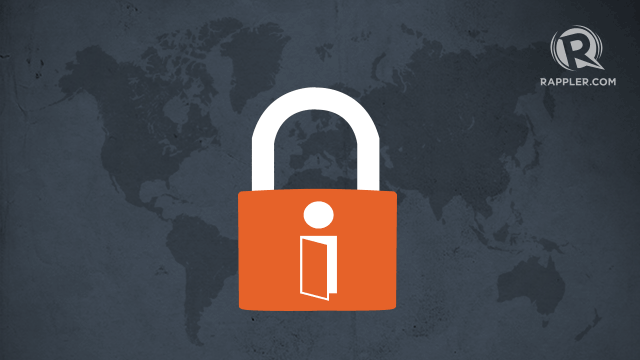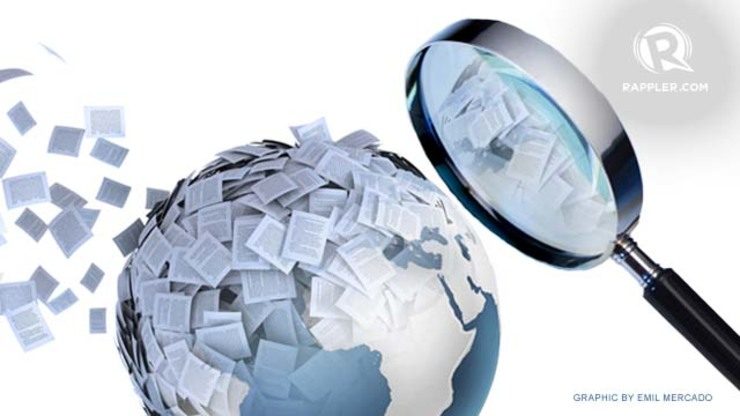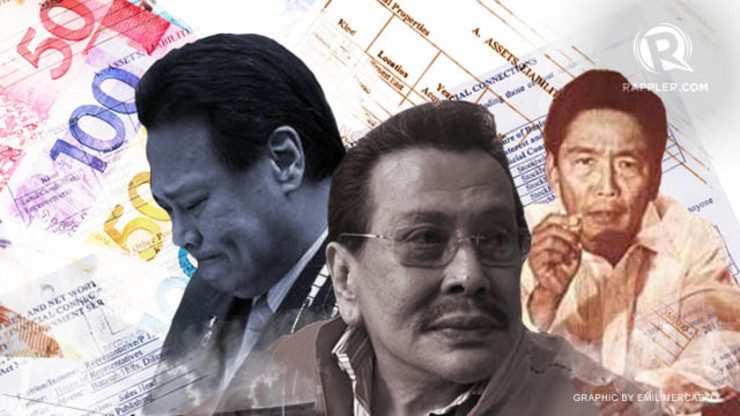SUMMARY
This is AI generated summarization, which may have errors. For context, always refer to the full article.

MANILA, Philippines – That they are called many different names – access to information, freedom of information or right to information – suggests that laws mandating people’s access to information held or generated by government have many purposes as well.
Almost two-and-a-half centuries since Sweden enacted the very first law that mandated the release of information held by government to the public, 95 countries have already enacted access to information laws. Such laws have since been invoked successfully to promote various causes.
Fast Facts: Freedom of information laws around the world
Freedom of information laws have been used as tools to prevent or expose abuses, improve delivery of services and even protect public health and welfare
Filed for the first time in the 8th Congress, the proposed Philippine FOI law remains pending in the House of Representatives months after the Senate finally approved it in March 2014. The House public information committee, which designated a technical working group to consolidate the different versions of the law in August and September, has yet to sponsor the measure on the floor for deliberations.
President Aquino and House Speaker Feliciano Belmonte have both committed to have the measure approved within their respective terms. As of this writing, and amid other legislative priorities, they have about a year to go to make good of that promise before the campaign season kicks in.
How will such a law affect affect how government works in the Philippines? To get an idea, here’s how citizens of countries with existing FOI laws have successfully invoked their respective laws to push for various causes.
 Awareness of government activities
Awareness of government activities
The activities of government officials are expected to be of interest to the public who will be affected by policies emanating from them. The level of access, however, varies per country. In some cases, citizens are granted access even to email correspondence of public officials.
- In Bulgaria, Lachezar Lisicov, a journalist from a local newspaper, requested in 2010, under their Access to Public Information Act (APIA), for the minutes of a private meeting held in 2008 between the Bulgarian president, Georgi Parvanov and Russian president, Vladimir Putin. Bulgaria had previously enacted its FOI law in 2000 and Lisicov believed the “private meeting” was of huge public interest because it involved discussions on “crucial energy projects and strategy.” When the president’s office failed to attend to his request within the 14-day limit set by APIA, he filed a complaint with the court. Two days after the case was filed, the minutes of the meeting were published on the website of the Council of Ministers. The court ruled that “private meetings (especially between public authorities) are not excluded from the general obligation to make and keep records.”
 Fighting corruption
Fighting corruption
Anti-corruption advocates hold that transparency is a fundamental element to eradicating, or at least minimizing, corruption. These countries have successfully invoked access to information laws to this effect.
-
In 2005, the United Kingdom’s newly-enforced Freedom of Information Act was tested by journalists seeking documentation on excessive travel expenses of members of the British Parliament, especially former Prime Ministers Gordon Brown and Tony Blair. In 2007, two years after the case was filed, the UK Information Commission and the Information Tribunal ruled to release the information. A comprehensive list of travel expenses was also published. The disclosure exposed cases of fraud, misuse of permitted allowances, and issuance of fake receipts by MPs and triggered resignations of key officials, the filing of cases, sanctions, and a strict independent body was created to oversee the expenses of the MPs.
Why the Philippines needs a freedom of information law
Do we want to prevent or, at the very least, reduce corruption by making processes more transparent now?
-
In Peru, a journalist named Mario Cardenas also invoked the access to information law to request for travel documents (including travel date, costs and purpose) of Huamanga City’s public officials. When his request was denied, he then filed a case in court invoking the country’s access to information law which was enacted in 2003. In 2012, the court, ruling in favor of Cardenas, required the city council to release the information.
-
Information access has also been invoked to curb abuses among non-governmental organizations. In Bulgaria, Georgi Milkov, the chairman of the Non-Governmental Organizations Center in the city of Razgrad, requested for the first pages of tax returns (2000-2008) of the Center for Economic Development – Razgrad from the National Revenue Agency in 2009. The former mayor of Razgrad was the chairman of the Center at that time. Milkov, thinking there was some corruption involved, wanted to find out if “the NGO was engaged in commercial activities and in what amount it declared income and profit from such activities.”
Though at first, the Administrative court ruled that the requested information is not within the scope of Access to Public Information Act (APIA), the Supreme Administrative Court (SAC) eventually ruled that it actually is covered by the APIA.
 Justice for human rights abuses
Justice for human rights abuses
Countries that have been ruled by authoritarian regimes or have gotten involved in wars, civil unrest or disputes, more often than not, are plagued with cases of human rights abuse. Oftentimes, stories of abuse remain hidden and surface only due to efforts of advocates who push the boundaries of information disclosure. These are some of the successful cases:
-
Mexico’s FOI law, enacted in 2002, has been invoked a number of times in relation to cases of enforced disappearance and killings that happened while the country was still under an authoritarian government. One such case was that of Rosendo Pacheco, a community leader nabbed by the military in the 1970s. His family invoked Mexico’s access to information law in 2008 in relation to his case. Pacheco’s family wanted to ask the public prosecutor, known as the Procuraduria General de la Republica (PGR), for a copy of the preliminary investigation into his sudden disappearance during the regime because it was not disclosed to them before. The court ordered the PGR to release the information in 10 days.
-
The first country to enact an FOI law outside of Europe, the USA has seen its access to information law successfully invoked a number of times to promote civil liberties and curb human rights abuses. One of the most recent cases involved the release in 2004 of documents showing how the US military treated detainees it rounded up as part of the post-9/11 War on Terror. Around 6,000 documents relating to abuses of detainees at Abu Ghraib prison were released after American civil liberties advocates clamored for their disclosure.
 Protecting the environment
Protecting the environment
While in some countries, fighting human rights abuses or curbing corruption have been the usual purpose of right to information, other countries have invoked it for the purpose of protecting the environment.
-
Four years after Indonesia enacted its FOI law, a mining advocacy group filed a case against public officials of the Samarinda district of East Kalimantan for allowing abuses by mining concessions in the area which resulted in a number of accidental deaths. The group invoked their freedom of information law in January 2012 to obtain documents that would support the case. In 2014, the court ruled in favor of GSM and ordered the revision of mining policies in the area.
-
In 2011, Russia’s newly minted access to information law (enacted in 2009) was tested when environmental activist Serafima Naumocheva invoked the law and requested for details about the exact route and dimensions of the M-10 Russia highway. The information would be used to analyze the impact of the construction on a nearby forest in Khimki town. This landmark ruling became the basis for similar subsequent decisions by Russian courts involving access to environmental information. This was previously uncommon.
 Health and safety
Health and safety
There are instances when information cannot be easily shared as disclosure could endanger the lives of people. However, there are also instances when failure to disclose information could cause harm. This case in Norway is an example.
-
Former professional divers in the North Sea from 1960-1990 suffered from health problems, causing disabilities and failure to work. Claiming that the state failed to provide information about decompression tables and the risks involved in diving operations, they asked for liability and compensation from the state.
In December 2013, the court ruled in favor of the divers, saying that “the authorities should have taken precautionary measures, [which includes providing] the divers with decompression tables which would have enabled them to assess the risks and give informed consent.”
 Protecting individual rights
Protecting individual rights
Access to information, though usually associated with government, can also be used to protect one’s own rights. This pilot from South Africa shows you how.
- In 2006, a retired South African Airways pilot was supposed to have two business class tickets as part of his retirement package. Just when he decided to use his ticket for a trip, he was told that there were no more business class seats available. He clearly saw passengers upgrading to business class and was also informed via phone that there were actually seats available.
He then filed a complaint and requested under the Promotion of Access to Information Act (PAIA) for “records to prove that he was denied the seat improperly.” While the South African Airways is a private company, it is still not exempted from PAIA because the records will be used to protect an individual’s right, which the pilot was able to prove, according to the court.
The long wait for a Philippine FOI law
In the Philippines, the right of the people to information on matters of public concern is enshrined in the Constitution. The “Code of Conduct and Ethical Standards of Public Officials and Employees” also makes responsiveness and openness of information one of the key responsibilities of government officials.
Those who don’t see any urgent need for an FOI law in the country have argued that the implementing rules of this law are sufficient basis for granting the public access to information. The rules provide guidelines for the release of public documents.
The Philippine Supreme Court has also ruled that the right to access public information is enforceable even without an enabling law.
Time and again, however, government offices have seen fit to deny requests for information from the media and the general public without any clear grounds. Even access to asset and disclosure statements of public officials, which is mandated by law, has been denied on a number of occasions.
Unfortunately, the Code of Conduct itself is often cited as reason for the non-release of information as the same law also penalizes disclosure and misuse of “confidential information.” The boundaries between what is confidential and what is not, however, have yet to be clearly defined. Hence the clamor for a Philippine access to information law. – with Gwen de la Cruz and Gemma B. Mendoza/Rappler.com
Sources:
right2info.org FOI cases, rti-rating.org country data including their FOI laws, freedominfo.org, various news websites
 Research for this article was supported by the Friedrich Naumann Foundation for Freedom. Research for this article was supported by the Friedrich Naumann Foundation for Freedom. |
Add a comment
How does this make you feel?




There are no comments yet. Add your comment to start the conversation.